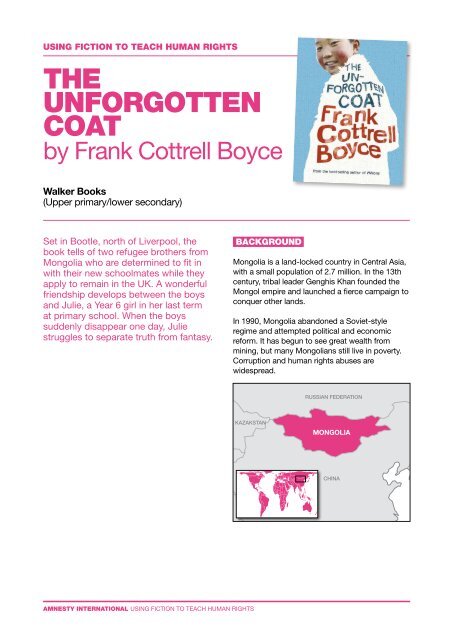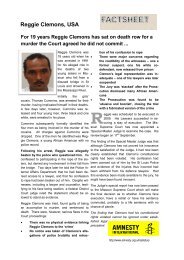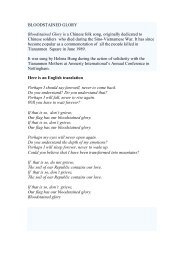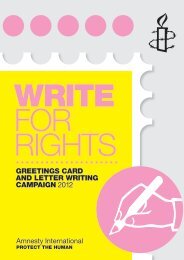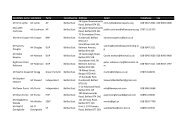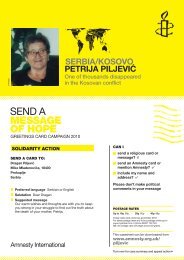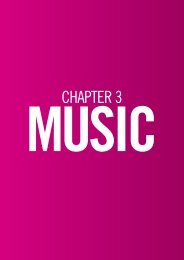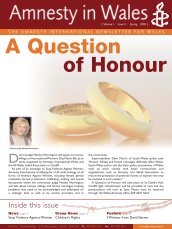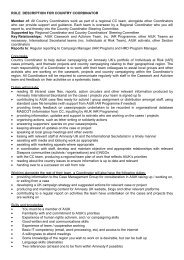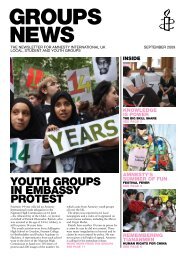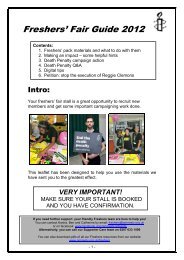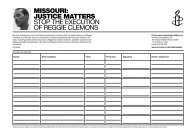The Unforgotten Coat by Frank Cottrell Boyce - Amnesty International
The Unforgotten Coat by Frank Cottrell Boyce - Amnesty International
The Unforgotten Coat by Frank Cottrell Boyce - Amnesty International
Create successful ePaper yourself
Turn your PDF publications into a flip-book with our unique Google optimized e-Paper software.
usIng fIctIon to teAch humAn rIghts<br />
the<br />
unforgotten<br />
coAt<br />
<strong>by</strong> frank cottrell <strong>Boyce</strong><br />
Walker Books<br />
(Upper primary/lower secondary)<br />
set in Bootle, north of Liverpool, the<br />
book tells of two refugee brothers from<br />
mongolia who are determined to fit in<br />
with their new schoolmates while they<br />
apply to remain in the UK. a wonderful<br />
friendship develops between the boys<br />
and Julie, a Year 6 girl in her last term<br />
at primary school. When the boys<br />
suddenly disappear one day, Julie<br />
struggles to separate truth from fantasy.<br />
<strong>Amnesty</strong> InternAtIonAl Using fiction to teach hUman rights<br />
BAckground<br />
mongolia is a land-locked country in central asia,<br />
with a small population of 2.7 million. in the 13th<br />
century, tribal leader genghis Khan founded the<br />
mongol empire and launched a fierce campaign to<br />
conquer other lands.<br />
in 1990, mongolia abandoned a soviet-style<br />
regime and attempted political and economic<br />
reform. it has begun to see great wealth from<br />
mining, but many mongolians still live in poverty.<br />
corruption and human rights abuses are<br />
widespread.<br />
KazaKstan<br />
russian federation<br />
mongolia<br />
china
IdeAs for the clAssroom<br />
role plAy<br />
• Take on the roles of Shocky and Julie and talk<br />
over what they learned from having chingis and<br />
nergui in their class.<br />
• Imagine Julie’s conversation via Skype with<br />
chingis and nergui when they are all grown up.<br />
QuestIons for dIscussIon<br />
1. What do you think are the advantages of<br />
being a guide for Chingis and nergui?<br />
Possible answers:<br />
• Learning about a different culture eg horses,<br />
genghis Khan, Xanadu<br />
• Explaining host culture eg football, Monster<br />
munch<br />
2. ‘Practically everyone we know vanished. That’s<br />
why we had to leave home – because people<br />
kept vanishing.’ (p72) What reasons can you<br />
think of that could have made Chingis and<br />
nergui leave mongolia?<br />
3. Why do you think Chingis faked the photos?<br />
4. ‘I knew that everyone in that house was afraid.’<br />
(p56) How do you think Julie feels when she<br />
realises why Chingis and nergui were trying<br />
to run away?<br />
5. Why do you think the book is set out as it is,<br />
ie written as if in an exercise book and with<br />
the Polaroid photos? What was the writer<br />
trying to convey?<br />
<strong>Amnesty</strong> InternAtIonAl Using fiction to teach hUman rights<br />
unIversAl declArAtIon<br />
of humAn rIghts<br />
article 3: We all have the right to life, and to live in<br />
freedom and safety.<br />
article 15: We all have the right to belong to a<br />
country.<br />
follow-up ActIvItIes<br />
invite students to take photographs of their<br />
environment which capture emotions that they<br />
would like to remember later. ask students to give<br />
the photographs titles. make a classroom display.


